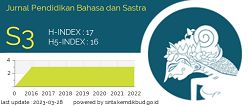THE EFFECT OF WRITTEN CORRECTIVE FEEDBACK ON HIGHER EDUCATION STUDENTS’ WRITING ACCURACY
Abstract
Abstract
With the higher demand of accuracy on students’ writing in university level, the present study examines the effect of direct and indirect written corrective feedback (WCF) on students’ L2 writing accuracy. The study was conducted in a six-week period with 43 Indonesian university student participants majoring IT. The results of the pre- and post-writing tests showed that 1) the writing accuracy improvement of the students receiving direct WCF was statistically significant while the writing accuracy improvement of the students given the indirect WCF treatment was not; 2) the accuracy improvement in the untreatable error rate of the direct WCF group was the most significant compared to all types of error in both WFC student groups. The study concludes that considering the students’ current English proficiency level and learning setting with limited English exposure, written corrective feedback, especially the direct one, helps the university students improve their writing accuracy.
Keywords: corrective feedback, L2 writing, higher education
Keywords
Full Text:
PDFReferences
Ashwell, T. (2000). Patterns of teacher response to student writing in a multiple-draft composition classroom: Is content feedback followed by form feedback the best method? Journal of Second Language Writing, 9, 227-258.
Bitchener, J., Young, S., & Cameron, D. (2005). The effect of different types of corrective feedback on ESL student writing. Journal of Second Language Writing, 9, 227-258.
Bitchener, J., &Knoch, U. (2008). The value of written corrective feedback for migrant and international students. Language Teaching Research, 12, 409 -431.
Chandler, J. (2003). The efficacy of various kinds of error feedback for improvement in the accuracy and fluency of L2 student writing. Journal of Second LanguageWriting, 12, 267–296.
Ferris, D. R. (1999). The case for grammar correction in L2 writing classes: A response to Truscott (1996). Journal of Second Language Writing, 8, 1-10.
Ferris, D. R. (2002). Treatment of error in second language student writing. Ann Arbor: University of Michigan Press.
Ferris, D. R. (2006). Does error feedback help student writers? New evidence on the short and long-term effects of written error correction. In K. Hyland & F. Hyland (Eds.), Feedback in second language writing: Contexts and issues (pp. 81-104). New York: Cambridge University Press.
Ferris, D. R. (2010). Second language writing research and written corrective feedback in SLA: Intersections and Practical Applications. Studies in Second Language Acquisition, 32, 181-201.
Ferris, D. R., & Roberts, B. (2001). Error feedback in L2 writing classes: How explicit does it need to be? Journal of Second Language Writing, 10, 161-184.
Frear, D. (2009). The effect of focused and unfocused direct written corrective feedback on a new piece of writing. College English: Issues and Trends, 3, 57-72.
Ellis, R. (2008). The study of second language acquisition (2nd ed.). New York: Oxford University Press.
Ellis, R. (2010). A framework for investigating oral and written corrective feedback. Studies in Second Language Acquisition, 32, 335-349.
Ellis, R., Sheen, Y., Murakami, M., & Takashima, H. (2008). The effects of focused and unfocused written corrective feedback on Japanese university students’ use of English articles in narratives. System. 36 353-371.
Sheen, Y. (2007). The effect of focused written corrective feedback and language aptitude on ESL learners’ acquisition of articles. TESOL Quarterly, 41, 255-283.
Truscott, J. (1996). The case against grammar correction in L2 writing classes. Language Learning, 46, 327-69.
Van Beuningen, C.G., De Jong, N.H., &Kuiken, F. (2008). The effect of direct and indirect corrective feedback on L2 learners' written accuracy. ITL International Journal of Applied Linguistics 156, 279-296.
DOI: https://doi.org/10.17509/bs_jpbsp.v16i2.4476
Refbacks
- There are currently no refbacks.
Copyright (c) 2016 Jurnal Pendidikan Bahasa dan Sastra
p-ISSN 1412-0712 | e-ISSN 2527-8312
JPBS is published by:
Fakultas Pendidikan Bahasa dan Sastra (Faculty of Language and Literature Education), Universitas Pendidikan Indonesia,
in cooperation with
TEFLIN, and APPBIPA


